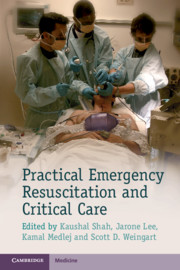Book contents
- Practical Emergency Resuscitation and Critical Care
- Practical Emergency Resuscitation and Critical Care
- Copyright page
- Contents
- Contributors
- Preface
- Abbreviations
- Section 1 General critical care
- Section 2 Trauma
- 6 General trauma principles
- 7 Severe traumatic brain injury
- 8 Spinal cord trauma
- 9 Neck trauma
- 10 Thoracic trauma
- 11 Solid organ abdominal trauma
- 12 Severe pelvic trauma
- 13 Compartment syndrome
- 14 Soft tissue injury: crush injury, arterial injury, and open fractures
- 15 Burns
- Section 3 Neurological emergencies
- Section 4 Cardiovascular emergencies
- Section 5 Respiratory emergencies
- Section 6 Gastrointestinal emergencies
- Section 7 Renal emergencies
- Section 8 Hematology–oncology emergencies
- Section 9 Infectious disease emergencies
- Section 10 Endocrine emergencies
- Section 11 Environmental emergencies
- Section 12 End of life
- Index
9 - Neck trauma
from Section 2 - Trauma
Published online by Cambridge University Press: 05 November 2013
- Practical Emergency Resuscitation and Critical Care
- Practical Emergency Resuscitation and Critical Care
- Copyright page
- Contents
- Contributors
- Preface
- Abbreviations
- Section 1 General critical care
- Section 2 Trauma
- 6 General trauma principles
- 7 Severe traumatic brain injury
- 8 Spinal cord trauma
- 9 Neck trauma
- 10 Thoracic trauma
- 11 Solid organ abdominal trauma
- 12 Severe pelvic trauma
- 13 Compartment syndrome
- 14 Soft tissue injury: crush injury, arterial injury, and open fractures
- 15 Burns
- Section 3 Neurological emergencies
- Section 4 Cardiovascular emergencies
- Section 5 Respiratory emergencies
- Section 6 Gastrointestinal emergencies
- Section 7 Renal emergencies
- Section 8 Hematology–oncology emergencies
- Section 9 Infectious disease emergencies
- Section 10 Endocrine emergencies
- Section 11 Environmental emergencies
- Section 12 End of life
- Index
Summary
- Type
- Chapter
- Information
- Practical Emergency Resuscitation and Critical Care , pp. 64 - 70Publisher: Cambridge University PressPrint publication year: 2013

